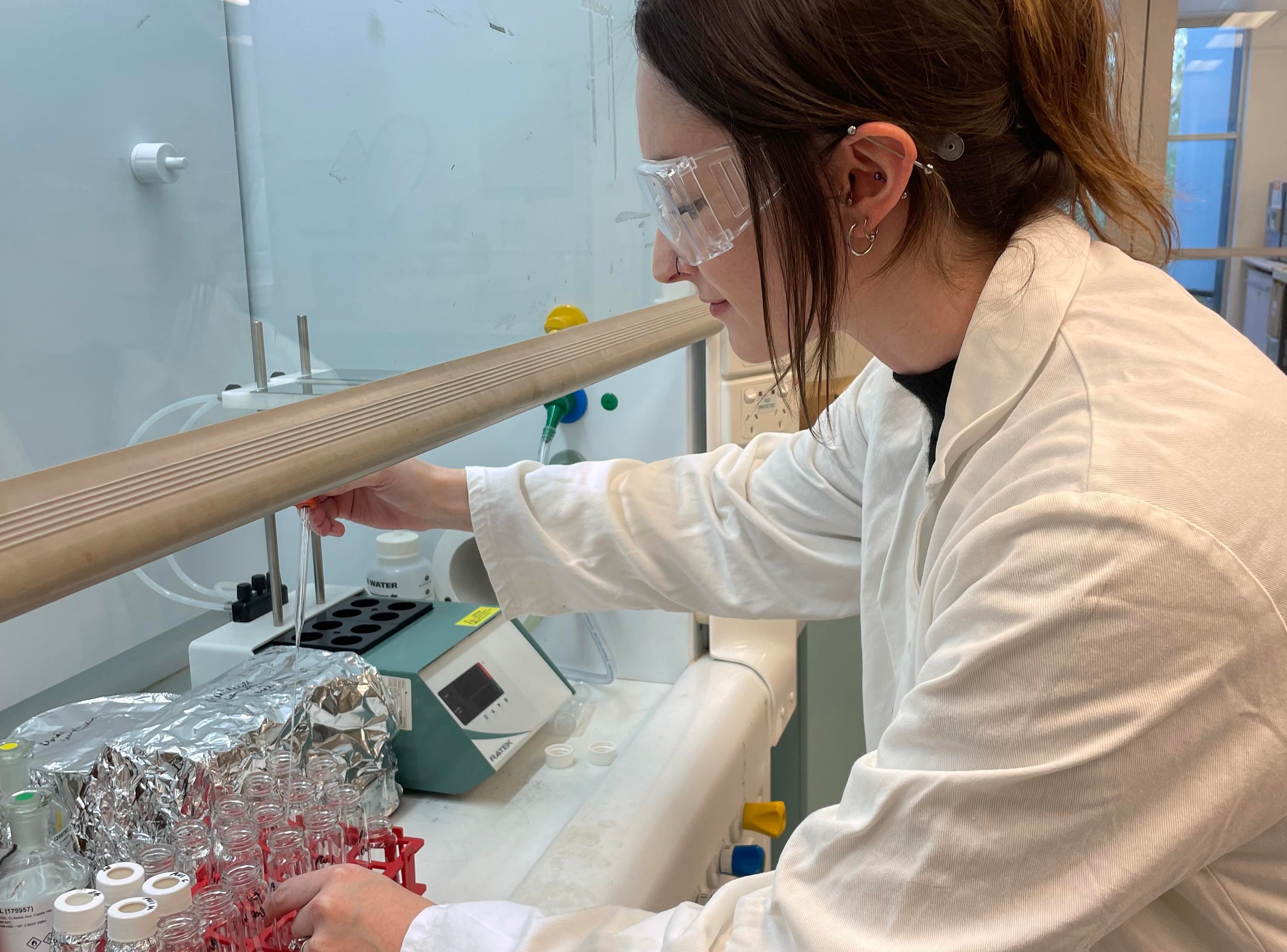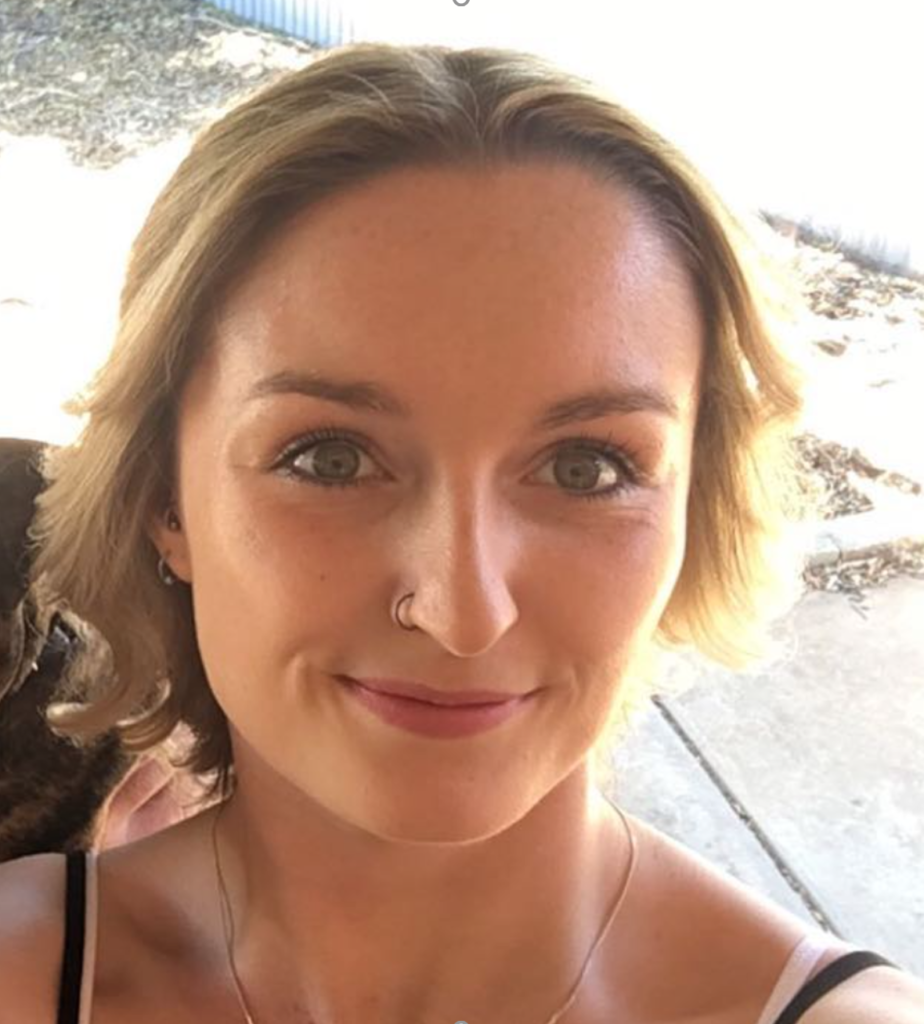
Hi folks, I’m Meghan, an HDR student here at Flinders University. I arrived in Adelaide in early February 2020 from Ireland (yes, I know, the timing, luck of the Irish maybe), on an international scholarship as part of Associate Professor Mike Morley’s ARC Future Fellowship project ‘Disperscapes’. This falls under the discipline title of ‘Geoarchaeology’, which in simple form applies methods and techniques from the Earth sciences (which is where I hail from), on sample materials recovered from archaeological sites to answer archaeological and environmental/climatic questions.
I really enjoy being a part of this team as it has allowed me to focus on my love for palaeoecology (another ‘ology’, yes). In brief, my Geoarchaeology PhD is centred around me applying various geochemistry techniques to sediment samples from an archaeological site in Laos, Southeast Asia, to develop a quantitative palaeoecological reconstruction (reconstruction of the past vegetation dynamics), of the local environment in and around the site.
My PhD scholarship and moving to Australia
What made me want to go down the path of a PhD? Quite simply, I enjoyed travelling. I mean, of course, I love wee holidays to Spain, Italy and the likes to kick back, but getting to travel as part of the SUNDASIA team to Vietnam on several occasions during my undergrad Bachelor of Science for my dissertation data and later as a graduate researcher was phenomenal.
I was hooked and wanted more of both palaeoecology and travel. I owe a lot to the SUNDASIA team. They were and still are a fantastic bunch of researchers and now close friends of mine. It was actually my SUNDASIA supervisor, Dr Ryan Rabett, that sent me the advertisement for this PhD opportunity when I was backpacking the east coast of Australia after I had finished my degree and encouraged me to apply.
Initially, I was hesitant. Not because I didn’t like the PhD but I was quite homesick as I came to Australia just after graduating from Queen’s University, Belfast in late 2018 and my mental health had taken a bit of a battering. So, I thought going home was best and I wanted to prepare for the Master of Science in Quaternary Science I had been offered.
After speaking to my dad a fair bit and going back and forth on it, he told me in short, you miss 100% of the chances you don’t take. I should still come home when I planned to, but at least give it a shot and send in the scholarship application. So, I did. Thanks, Dad. I can safely say I did not expect to be moving back to Australia and starting a PhD just after turning 23. As the first in my family to attend higher education, I can’t really say I had much of a plan on how to navigate it all. But here we are.
My palaeoecological research in archaeological settings
As for what inspired me in this area of research, it all started with two pretty amazing geography teachers in secondary school. Their work and support not only initiated the sequence of dominos that has gotten me to this point but also showed me just how important a great, involved and encouraging teacher is – which is what I ultimately aspire to be.
I am also a firm believer that generations that ignore history have no past, no present, and ultimately no future (I first saw this quote in my year 8 history class), and it has stuck. I really enjoy that my research allows me to explore my passion for the history of our climate, as research like this can assist us to better prepare for an uncertain future in the face of climate change.
In a nutshell, my thesis focuses on the extraction and study of stable isotopes from higher plant biomarkers (the ones I focus on are produced as part of the epicuticular wax layer of leaves and survive in the geological fossil record pretty well) from sediments to determine the vegetation type via the photosynthetic pathway they utilised in life.
By doing this (along with a few other bits and pieces), I can infer the local environmental conditions that prevailed during different periods (warm, wet, cold, dry etc). There are a few other elements of my research too, like how the cave settings from which I take my data influence the preservation and presence of certain biomarkers.
What makes it even more interesting is that the site I am working on is currently holding the earliest evidence of Homo sapiens’ presence in mainland Southeast Asia (there is older evidence on Island Southeast Asia), so my work will hopefully contribute to a better understanding of the influence of the climate/environment on their movements and behaviours.
I will cease here before going further down the rabbit hole of my work. I feel extremely fortunate to have such a great and supportive supervisory team backing me. Through their support, we have developed connections with the Earth Science department of the University of Adelaide and the School of Earth and Planetary Sciences, Curtin University.
At the time of writing this, I am preparing for my next 3-week stint of lab work over in Curtin to obtain the data for my third PhD paper. My first first-author paper has just been published recently, too!

Teaching & extracurriculars
I love teaching! It is honestly one of the main highlights of my PhD experience. I am really striving to be an effective educator, so that maybe one day, I can have an impact similar to the one my geography teachers had on me. It would be pretty cool to be a part of someone’s reason for pursuing their goals or assisting them in having the courage and confidence to keep pushing. I have been fortunate to have been offered discipline-specific teaching during my PhD so far, each of which has been fantastic, I can only hope this continues!
Outside of this, I am also grateful for being selected to be a part of the 2021 Academic Internship Program for Doctoral Students (AIPDS). This program is aimed at developing our knowledge, skills and different techniques applied to teaching and the power of pedagogies to us PhD students who are considering making an attempt at pursuing academic careers and the importance of the teaching element, not just the research.
This program led me to apply for and obtain the roles of Learning Advisor with the Student Learning Support Service (SLSS) and a Tutor on the Foundation Studies Program. I honestly do not think I can express in words not just how thankful I am to be in these roles, but how much I enjoy them, it truly is something else! A true highlight of the PhD journey has been working with the amazing SLSS team, they have taught me so much. I have also begun working with the Education Pathways team this year, which is terrific and exciting as things are in motion for work with secondary schools.
Aside from teaching and tutoring, I am excited to be the co-chair of the 2022 Geological Society of Australia’s Earth Science Student Symposium (GESSS-SA). This is a committee that operates across Flinders University, The University of Adelaide and UniSA.
As a team, we work together with the Geological Society of Australia and the support and sponsorships from various industries across the Earth sciences in Australia to plan, prepare and execute a student symposium (conference) at the end of each year. Here students, academics and industries come together to share snippets of their research. This also provides many with the opportunity to social network and meet new folks in the multiple disciplines that make up the Earth sciences. This is my second year on the committee, and I love it.
An experience I would recommend to anyone
The experience of working towards my PhD has changed me both professionally and personally in so many ways, pretty much all (if not all) of which have been for the better. Although I was initially nervous about taking the leap to move out to Australia again (although first time in Adelaide), I can honestly say it has been one of the best decisions of my life. I mean yes, the PhD has usurped any expectations I had, but it also led me to meet and recently marry my now husband! For this, I will be forever grateful.
If there was anything I could offer a fellow international considering taking up a PhD, it would be to be open to flexibility and the unexpected (it can be really fun), try not to be too regimented on exactly how your PhD will go, it will likely change in varying degrees (often for the better). Also, have a healthy work-life balance, (ideally with a separate space for conducting your work). For me, that’s the good old Monday to Friday at uni with the weekends and holidays off.
Persistence is key, you can do it! A superb supervisor also helps big time and for me, I have been lucky to find that in Mike Morley and my co-supervisors. Thanks again for everything, Mike. It’s a pleasure to work with you and to be a part of the ‘Disperscapes’ team!
Author: Meghan McAllister-Hayward
Interested in an international PhD scholarship? Find out more here.

